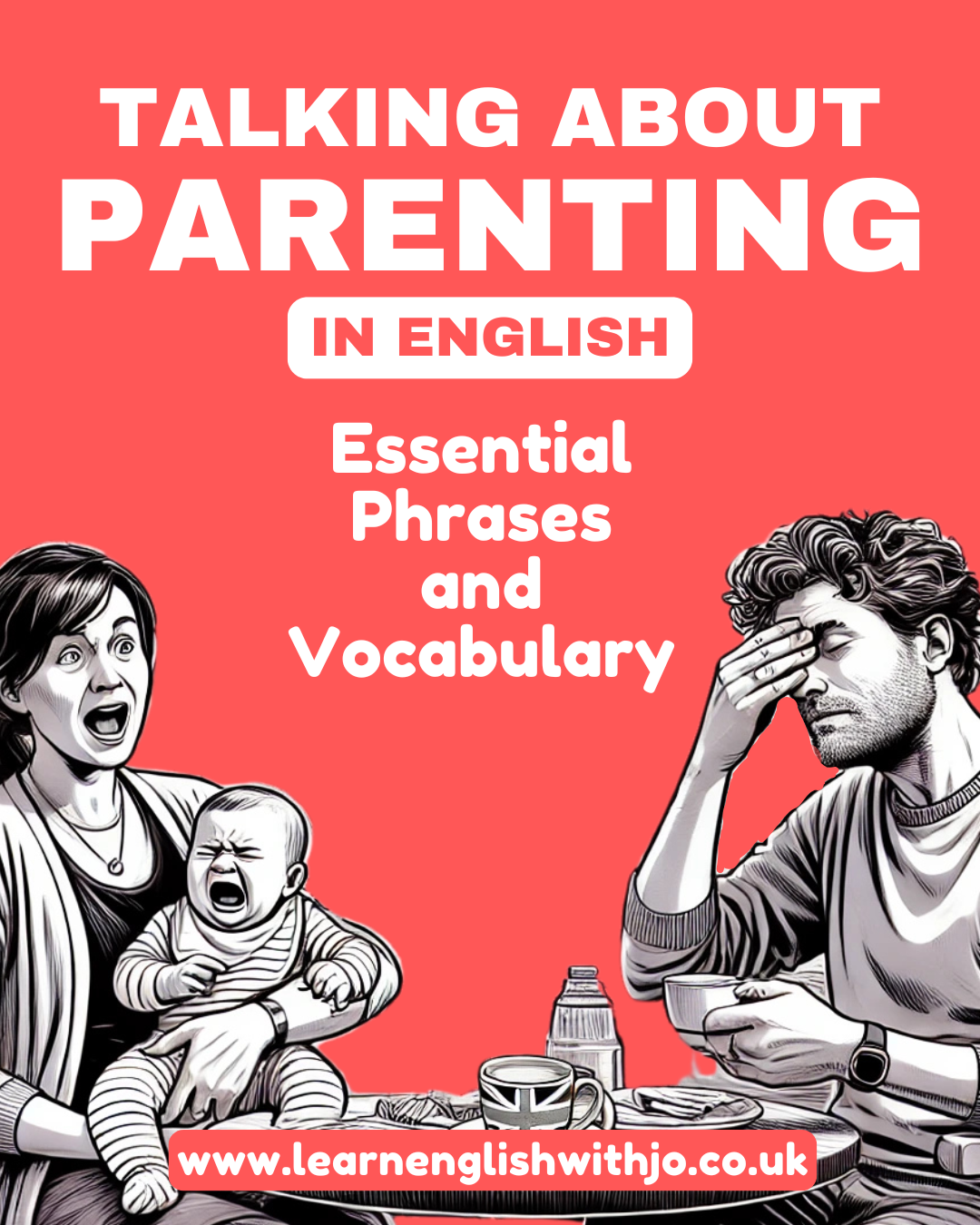English for talking about parenting.
Are you a parent? Do you want to talk about the highs and lows of parenting in English and familiarise yourself with some of the idiomatic language that is used to discuss this topic? Today’s blog (and Netflix recommendation) is for you!
Parenting is a word that carries many emotions: joy, exhaustion, love, frustration, pride, worry, and—let’s be honest—a fair amount of winging it.
I’m a single parent to two almost adults who are both in their late teens and as a mother, a topic that always pops up in my daily conversations is the kids.
Having the right vocabulary and phrases to talk about the ups and downs of parenting in English can be incredibly useful in sharing our lives, making connections and offloading our day to day stresses. So today we’re going to explore some essential English vocabulary and expressions for all you parents out there who want to improve your English-speaking skills and feel more confident discussing parenting.
English for Parents: Speaking English About Parenthood
Tag-team parenting – When two parents take turns managing childcare responsibilities.
Example: We practice tag-team parenting—when I’m busy, my partner takes over, and vice versa.
Co-parenting – Sharing parenting duties, often after separation or divorce.
Example: Co-parenting can be challenging, but clear communication makes a big difference.
Single-parent – A parent raising a child without a partner.
Example: As a single parent, I’ve had to learn how to juggle everything on my own.
Juggling parenting and work – Balancing the responsibilities of raising children while working.
Example: Trying to juggle parenting and work can feel like an impossible task some days.
The mental load – The invisible, ongoing planning and organising involved in running a household and raising kids.
Example: The mental load of keeping track of everything—appointments, meals, school events—can be exhausting.
Parenting styles – Different approaches to raising children, such as authoritative, permissive, or free-range parenting.
Example: Our parenting styles are quite different—I’m more relaxed, while my partner prefers structure.
English for Parents: Common Phrases for Everyday Parenting Struggles
Spinning plates – Trying to manage multiple responsibilities at once, often feeling overwhelmed.
Example: Between work, school, and household chores, I’m constantly spinning plates!
The school run – The daily task of dropping off and picking up children from school.
Example: Mornings are chaotic in our house because of the school run.
Bedtime routine – The established series of activities before a child goes to bed.
Example: A consistent bedtime routine helps children sleep better.
Teething troubles – The difficulties and irritability babies experience when their teeth start coming in.
Example: We haven’t had much sleep lately because of our baby’s teething troubles.
Running on fumes – Feeling exhausted, often due to lack of sleep.
Example: After a night of waking up with the baby, I’m running on fumes today.
Pick your battles – An expression meaning to focus on the important issues rather than every small problem.
Example: When parenting, you have to pick your battles—sometimes, messy rooms just aren’t worth the fight.
Winging it – Getting through parenting challenges without a clear plan or strategy.
Example: Most days, I’m just winging it and hoping for the best!
Netflix Recommendation for Parents
If you want to improve your English while enjoying a humorous and brutally honest take on British parenting, I highly recommend watching Motherland on Netflix a British sitcom that perfectly captures the chaos, competitiveness, and everyday struggles of modern parenting. The show is filled with natural, conversational English, making it a great way to pick up useful expressions, everyday vocabulary, and British humour.
By following a group of middle-class parents navigating school runs, birthday parties, and the constant juggle of work and home life, you’ll hear real-life dialogues that reflect how people actually speak. It’s packed with sharp dialogue, social satire, and brilliantly awkward situations that most parents will recognise. Whether you’re a single parent, co-parenting, or just winging it, Motherland provides both laughter and a sense of solidarity in the universal experience of raising kids—all while helping you become more familiar with authentic spoken English.
How to Use These Phrases to Improve Your English Speaking Skills
Talking about parenting is not just about vocabulary—it’s about connection. If you want to speak about parenting in English more fluently then try using these phrases in everyday conversations.
You can practice speaking English with other parents, discuss parenting topics in English, watch TV dramas like Motherland or find some parent content creators on social media to follow. Not to mention all the podcasts out there aimed at frazzled parents!
Of course, you could also book an English conversation class with me!

